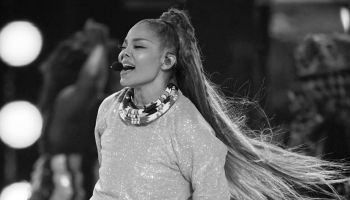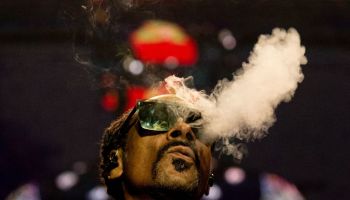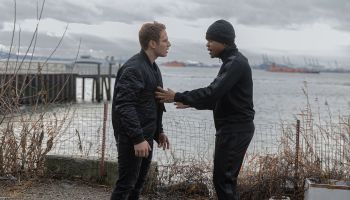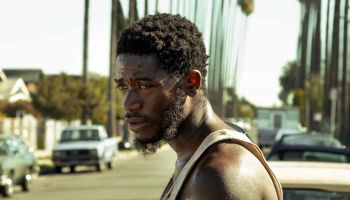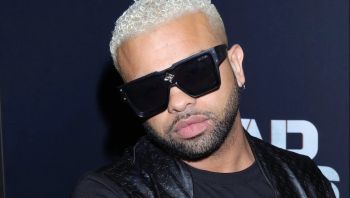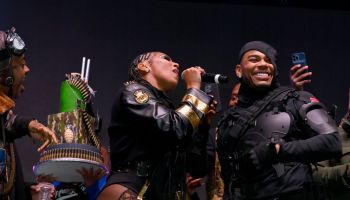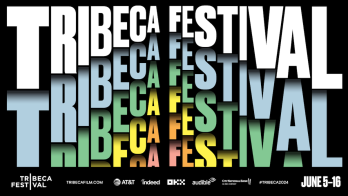Homosexuality in hip-hop, is still in the 21st Century, a taboo. If it is addressed at all, it is done in ridicule or to dehumanize an individual.
Take Raekwon and his comments on Angela Yee’s radio show a year ago for example: “My mouth is too small to suck a d*ck,” Raekwon said. “How the f*ck do you convert over to do some sh*t like that? How do motherf*ckers get into that sh*t? The males? The females, they gonna do what they do. I ain’t gonna front, I can’t stand f*cking h*mos. That sh*t is just f*cking disgusting. They can never holla at me. Get the f*ck away from me, immediately.” Raekwon was on Angela Yee’s show Rumors along with Snoop from “The Wire”).
PHOTOS: UNCOVERED: Lawrence Campbell AKA Brooke-Lynn, Mister Cee’s Co-Defendant
If a film or a TV show depicts a gay character operating within the context of hip-hop, that character is hypermasculine and murderous, traits that eclipse the character’s humanity, characteristics like another “Wire” character, Omar Little.
Hip-hop loved Omar. Hip-hop loved how many bodies Omar dropped with bullets over drug money. The bodies Omar bedded, the men he loved? We don’t want to talk about that. Which is interesting when you take into context the unfolding drama surrounding DJ Mister Cee and his legal troubles involving an alleged transvestite last week.
Mister Cee, behind the mic, is gangster! He produced and plays the records of other gangsters. Friends and family of Mister Cee should be angry by his choices if they are true. Not because of the act that was allegedly performed on him by a male in a parked car. No. They should be angry because he hid himself from people who love him.
[pagebreak]
If Mister Cee hid himself from friends and family it was because of fear. And it is fear that is preventing us from talking honestly as a community about homosexuality and hip-hop; the same fear that cloaked our loved ones, by blood or by daps, in masks so they are unrecognizable when their secret lives hit the light.
A serious discussion about homosexuality among men in hip-hop is long overdue and the best place to start is with one of hip-hop’s favorite deejays, Mister Cee.
This discussion will save lives. This discussion will make our uncles, brothers, nephews, cousins and friends stronger and will weed out those who do not and can not love us for who we are: straight, gay, bi-sexual or confused men living in a society that would rather see us dead or locked up.
Will it be difficult? Yes. But hip-hop is known for talking about difficult things: in cyphers, on wax and on tour, hip-hop talks about barely there or missing fathers and mothers, siblings and friends, pulling-teeth-painful betrayals, gut wrenching relationships with the State and nerve wrecking romance with women, drugs, poverty and the struggle to survive, to identify a few topics.
The last time we heard and came close to having a discussion about about gay men in hip-hop was back in 2008 when author Terrence Dean published his vague tell all “Hiding in Hip Hop.” And Superhead. And in the Gangstalicious episodes of “The Boondocks.” Although simultaneously uncomfortable and fun, we won’t touch the Raz B craziness nor the countless “No homo” prefaces on records and on Twitter offered by Dipset.
Above: Queen Latifah played bank robber and homo thug CLEO in “Set It Off,” one of hip-hop’s first gay on screen characters.
[pagebreak]
CNN’s Nore came the closest to sparking a conversation a few years ago when he said, “The gay community is here.” Nore said this in an interview with VLAD TV: “It’s not secretive. When you’re in the industry and the minute you make a certain amount of money, you cannot avoid it…And the craziest thing in the world is you get used to it…They don’t bother you, son, most gay men don’t like straight guys…I have recorded, not with people who are openly gay, but people who are closet gays. I’ve got songs, you know, Google it. I’m positive I have worked with a gay rapper. I didn’t know [beforehand] but when I found out, I didn’t jump off a diving board into a pool full of sharks. It is what it is…I’m sure my sexuality messing with b*tches does not make them mad…There is [a successful gay rapper out now] and he won’t get me to say the name. Once he’s a success story to the point where he can’t be stopped, then yeah, he’s gonna come out the closet…It’s not a big secret, everybody is gonna be like, ‘Oh yeah, I knew that.'”
Kanye West, back in 2005, looked like was about to champion the end of homophobia in hip hop. “I’m still trying to get over my own homophobia,” Kanye said in KING magazine. “I still wouldn’t feel comfortable at a gay bar. I wouldn’t go to a gay parade. I don’t know if I’m in favor of gay marriage or not. People said to me, ‘Were you scared of speaking out against George Bush?’ No. The bravest thing I did this year was speaking out against homophobia. That’s a scarier topic, because if you bring it up, people think you must be gay. But you don’t have to be gay to not gay-bash. We’re a very close-minded people.”
Mister Cee’s debacle, if true, gives us another chance to talk about our family and friends in a loving, honest way.
After the break, a look at hip-hop’s favorite homo thugs.
Above: The character Snoop was a killer for hire on The Wire. Her weapon of choice was a nail gun.
[pagebreak]
The Ballad of Gangstalicious was a re-occurring storyline on “The Boondocks. In its unique way, the animated show tried to address homophobia in hip-hop. Video is below.
[pagebreak]
Though the character he played was a caricature, Terry Crews’ Damon from “Friday After Next,” was an interesting study on homosexuality and masculinity and was, through fear, welcomed by his community.









